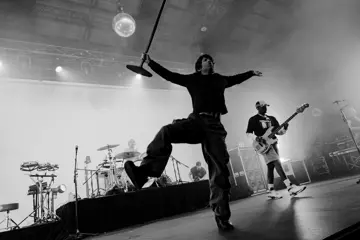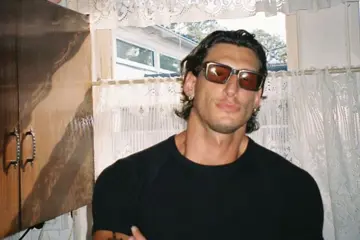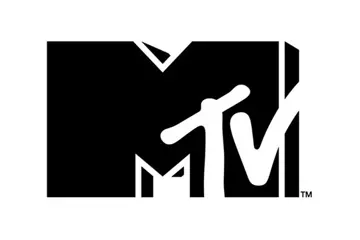The fact that Sacha Baron Cohen is appearing, promotionally, in character – and that he attempted to 'crash' the Oscars in his latest guise – does a great disservice to The Dictator. This suggests that, yet again, the English comedian is hewing to a formula that, with 2009's awful, annoying, try-hard Brüno, was instantly inert; The Dictator, as dictated by its marketing campaign, bound to be yet another film finding Cohen in character, duping 'real' people into revealing their idiocy in punk'd-ish sequences. Yet, in actually, the guerrilla pranksterism is completely abandoned; instead, this time, Cohen and collaborateur Larry Charles gladly stick with the script.
Of course, the early pages of said script aren't particularly impressive, The Dictator going for the obvious gags as we enter the world of a murderous, delusional dictator of a fictional North African nation; the 'joke' of a juvenile, pussy-hungry idiot with unlimited power and a murderous streak wasn't funny in Lee Tamahori's tedious The Double – a blatantly fake 'true' story of life as the body-double for one of Saddam Hussain's sires – and it's not much better here. When the narrative makes its obligatory 'take it to America' shift, it doesn't seem as if things are going to get much better.
But the further The Dictator goes (during a wonderfully-brief 80 minutes), the more ridiculous its jokes are (at one stage it actually reminded me of the immortal spy-movie parody Top Secret!), the more risks it takes, the more envelopes it pushes, and the more it hopes to provoke; the early notes of racist stereotype becoming – as in Borat – a study of racism, and greater cultural values. The film goes from fish-out-of-water farce to sharp satire; with American imperialism, hyper-capitalism's perversion of 'democracy', and the abuses of wealth/privilege being its obvious targets.
The Dictator makes its anti-hero into a hero, fashions its backwards third-world dictatorship into a symbol for the United States itself, and questions the political/humanist values of those who adhere to the righteous goodness of the Free Market, in which the movement of currency is a panacea for any social/global ill. In and amongst the film's most off-the-wall (and, thus, best) jokes – a helicopter flight, an emergency birth, and an undercover mission at a ghetto funeral all work brilliantly – there's a recurring gag about Hollywood royalty, and for what price they can be bought, sexually.
Don't miss a beat with our FREE daily newsletter
On a surface level, it's an excuse for easy celebrity jokes and convenient comic cameos, but the subtext is amazing: here every actor becomes literal prostitute, willing to compromise principles, trade on their fame, and maybe a suck a lil' cock as long as there's enough cash in it for them. Given America's national identity is inextricably tied up in the fantasies of Hollywood and its exported visions of power and excess, it's telling that Cohen uses the currency of celebrity to make happy mockery of the emptiness of the nation itself: the hyper-capitalist hegemony a veritable dictatorship, a life of consumption its own form of oppression, and every citizen therein able to be bought and sold by those in power.
Where The Dictator manages to free itself from formula, Dark Shadows is sadly saddled with it. It's the latest film for Tim Burton, and even the most liver-pickled wino would pass out if some drinking game were played in which every tired Burton trope – say: camera whooshing through CGI mist towards looming Gothic castle as Danny Elfman score cavorts impishly – was met with a shot.
Where Burton once, long ago, was the kind of singular stylist whose presence allowed mediocre entertainments to rise above their station – as with, say, the underrated Sleepy Hollow, which was infinitely more interesting, inventive, and intense than it had a right to be – watching Dark Shadows I couldn't shake the feeling that the presence of the director was the least interesting thing about it. That's hardly a revelation coming off a recent run that's included such artistic disasters as the shit Planet Of The Apes, the maudlin awards-show chaser Big Fish, the inessential Charlie And The Chocolate Factory, and the Disneyfied blandeur of Alice In Wonderland. But given he'd previously shown a loving affection for camp with Mars Attacks! and Ed Wood, it's amazing to see how wildly, how badly Burton misjudges this adaptation of a so-bad-it's-good supernatural daytime soap-opera from the early'-70s.
Dark Shadows is most effective in its moments of super-broad comedy, with Johnny Depp as an 18th-century vampire flummoxed by the 'modern' life of super-kitschy 1972. Were it some minor fish-out-of-water comedy, the film might float on the back of Depp's eager performance —and, elsewhere, through similarly over-the-top turns from Helena Bonham Carter and Eva Green— and its easy sketch-comic tone. But when Burton turns to the supernatural elements of the tale, to its ghost tales and tragic back-stories and vampires and werewolves, he does not so with campy silliness, but with an attempt at serious spookiness and earnest drama; which is to say nothing of the attempted moments of genuine emotion and/or fight-scene climax. They come as a run of bum notes, each completely out-of-tune with the comedy that occupies most of the screen-time, making for a disharmonious, jarring effect that derails the narrative; Dark Shadows a cacophonous calamity in which its maker is, aesthetically speaking, utterly tin-eared.
Michael Winterbottom would theoretically be the filmmaker furthest from having a formula; his career unfolding like some kind of English Soderberg, maintaining artistic independence yet hoping to function like the studio helmers of old, jumping from project to project, genre to genre, constantly at work. Yet, amidst his ever-varied, ever-vaster career (12 films in the past 10 years!), there are recurring quirks, motifs, fondnesses, etc; and Trishna picks up on several of these. It marks Winterbottom's third adaptation of Thomas Hardy, following 1996's Jude and 2000's The Claim; but where those adaptations were period-pieces drawing-roomy and dirt-caked, respectively, this time he modernises the text; shifting the narrative from 19th-century rural England to 21st century India, and turning cut-dry writerly dialogue into mumbled improv banalities.
Like The Road To Guantánamo, it starts out with a crew of Desi Brits backpacking back to their cultural 'homelands'; 20-something bros laughin' it up as they dig up their third-world roots. And, sure enough, there's a sinister turn ahead; though, this time, it comes disguised as love. From amongst the bros, Jay (Riz Ahmed) emerges, identifiable for his burning ardour for the village dame Trisna (Freida Pinto); and soon the narrative isn't a travelogue on foreign shores, but a defiantly local drama – like the novel, about the encroaching forces of industrialisation impacting traditional communities – and, finally, a defiantly silly melodrama.
Winterbottom's camera wobbles with the tics of new millennial vérité, but the barrage of edits and hammering score create a busy compositional manner that suggests the true theatricality of the piece. Soon our swooning tourist reveals himself to be a cold, manipulative prick, and the titular dame becomes not the prized object of his affection but a prisoner of his love; a tragic heroine on her way to that sad, resigned fate of all tragic heroines. Those going in expecting something measured —due to the name of the man behind the camera, or having watched A Mighty Heart or whatever— may be nonplussed by the strange change in narrative tone, but not many 19th century tragedies can accommodate politically-modernist realism.















